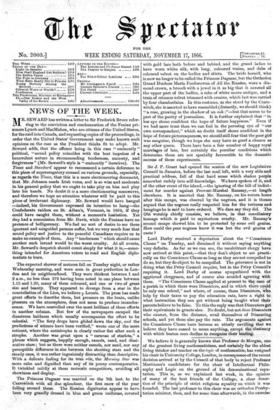Lord Derby received a deputation about the "Conscience Clause" on
Tuesday, and dismissed it without saying anything very definite. As far as we can see, the recalcitrant clergy have now arrived at this point,—that they don't object to act practi- cally on the Conscience Clause so long as they are not compelled to do so, but they do object to be compelled. The grievance is not in doing what the Privy Council require, but in the Privy Council's- requiring it. Lord Derby of course sympathized with the aggrieved clergymen, and of course also avoided agreeing with them. "The Conscience Clause applied at present to the case of a parish in which there were Dissenters, and in which there could be only one school," and where, of course, those Dissenters, who help by their taxes to pay the education rate, have a right to what instruction they can get without being taught what their parents believe to be false. To this the reply was that Dissenters get their equivalents in grants also. No doubt, but not those Dissenters who cannot, from the distance, avail themselves of Dissenting schools, and yet these also pay the rate. The arguments against the Conscience Clause have become so utterly cavilling that we believe they have ceased to mean anything, except the obstinacy with which beaten men decline to recognize their beating.






























